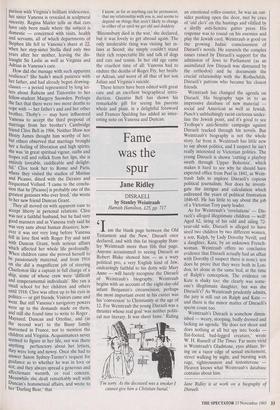Fame was the spur
Jane Ridley
DISRAELI by Stanley Weintraub Hamish Hamilton, £25," pp. 717 Iam the blank page between the Old Testament and the New,' Disraeli once declared, and with this fat biography Stan- ley Weintraub more than fills that page. Anyone accustomed to seeing Disraeli as Robert Blake showed him — as a wary political pro, a very English kind of Jew, endearingly faithful to his dotty wife Mary Anne — will barely recognise the Disraeli of Weintraub's biography. Weintraub begins with an account of the eight-day-old infant Benjamin's circumcision; perhaps the most important event in his career was his 'conversion' to Christianity at the age of 12. For Weintraub the young Disraeli was a thruster whose real goal 'was neither politi- cal nor literary. It was sheer fame.' Riding 'I'm sony. As the deceased was a smoker I cannot give him a Christian burial.' an emotional roller-coaster, he was an out- sider pushing open the door, met by cries of 'old clo's' on the hustings and vilified by a shrilly anti-Semitic gutter press. His response was to round on his enemies and play the Jewish card. Weintraub is good on the growing Judaic consciousness of Disraeli's novels. He unravels the complex issues raised by Disraeli's support for the admission of Jews to Parliament (as an assimilated Jew Disraeli was distrusted by the orthodox) and he documents the crucial relationship with the Rothschilds, Disraeli's patrons who became his closest friends.
Weintraub has changed the agenda on Disraeli. His biography taps in to an impressive database of new material — social and American as well as Jewish. Punch's unblushingly racist cartoons under- line the Jewish point, and it's good to see Trollope's anti-Semitic campaign against Disraeli tracked through his novels. But Weintraub's biography is not the whole story, far from it. Weintraub has little new to say about politics, and I suspect he isn't really interested in Victorian politics. The young Disraeli is shown 'cutting a playboy swath through Upper Bohemia', which makes it hard to see why he should have expected office from Peel in 1841, as Wein- traub fails to explore Disraeli's copious political journalism. Nor does he investi- gate the intrigue and calculation which enlivened the years of political frustration 1846-65. He has little to say about the job of a Victorian Tory party leader.
As for Weintraub's 'revelations' — Dis- raeli's alleged illegitimate children — well! Aged 62, tiring of his odd and ailing 72- year-old wife, Disraeli is alleged to have sired two children by two different women, a son, Ralph, by Lady Dorothy Nevill, and a daughter, Kate, by an unknown French- woman. Weintraub offers no conclusive evidence that Disraeli actually had an affair with Dorothy (I suspect there is none): nor does he prove that they were both in Lon- don, let alone in the same bed, at the time of Ralph's conception. The evidence on Kate is shaky too: she clearly was some- one's illegitimate daughter, but was she Disraeli's? As Weintraub prudently admits, the jury is still out on Ralph and Kate — and there is the minor matter of Disraeli's sperm count too.
Weintraub's Disraeli is somehow dimin- ished — weary, stooping, badly dressed and lacking an agenda. 'He does not shoot and does nothing at all but spy into books — flat-footed, bad-legged creature,' wrote W. H. Russell of The Times. Far more vivid is Weintraub's Gladstone, eyes ablaze, liv- ing on a razor edge of sexual excitement, street walking by night, and bursting with rage, righteousness and testosterone — Heaven knows what Weintraub's database contains about him.
Jane Ridley is at work on a biography of


























































 Previous page
Previous page